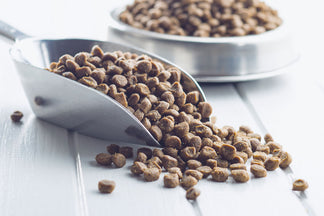Besides proving energy for basic metabolic functions and movement, food can help support (or hinder) the body’s ability to maintain a strong muscular-skeletal structure, support organ health, enhance the immune systems, and basically ensure that the body is running on “all cylinders”. Active dogs (and humans) require high level function and overall strength with regard to their bones, muscles, joints, lungs, and digestion in order to deal with the physical stress of being active. Each of these areas can benefit from specific micronutrients so it is important to understand how a dog’s diet can impact the overall function of their body. Today, we will focus on the nutrients that are needed to support strong and healthy bones.
What are Bones Made of?
Bone tissue is comprised of a mixture of minerals (for structure and hardness) deposited around a protein matrix (i.e. collagen) for flexibility. It is a bone’s flexibility that allows it to bend slightly but not break under most normal levels of stress.
According to the Linus Pauling Institute at Oregon State University, about sixty-five percent of bone tissue is made of mineral. The major minerals found in bone are calcium and phosphorus. Magnesium, sodium, and potassium are also present in various degrees. The remaining 35% of bone tissue is an organic protein matrix, almost 95% of which is type I collagen. Collagen fibers twist around each other and provide the interior scaffolding that supports the layers of bone minerals to form the bone.
Minerals that Support Bone Strength
The primary minerals that are key to bone health include calcium, magnesium, and phosphorus. Each of these minerals need to be available to the body as part of the bone regeneration process. They all provide additional health benefits as well.
Calcium. Calcium is the most abundant mineral in the body and serves many functions to support overall health. Calcium is the building block for bone growth and regeneration. Calcium also helps the body contract its muscles, supports proper nerve transmission, and blood coagulation (clotting), among other things.
If a dog’s diet is calcium deficient, their body will use calcium from the bones to ensure normal cell function, which can lead to weakened bones. Calcium deficiency can also lead to nervous system problems such as irritability, anxiety, and difficulty sleeping.
It is important to note that overloading a body with calcium can cause symptoms similar to calcium deficiency. The interaction between calcium and phosphorous is critical and there needs to be a balance between these two minerals in the diet. Somewhere around 2 to 2.5 times calcium to 1 times phosphorous is considered optimal for dogs. The upshot? Don’t blindly use calcium supplements without considering the overall diet and balance of other minerals.
Foods high in calcium and that are included in some dog food formulas include sardines and salmon, green leafy vegetables including kale, dandelion greens, and broccoli, as well as nuts and seeds, including almonds and pumpkin seeds.
Magnesium. Magnesium helps the body absorb and retain calcium, which helps support bone health. It also helps the body to convert calcium in the blood into usable form for muscle and nerve function, as well as to generally support the central nervous system and cardiovascular health. Magnesium deficiency can lead to weakened bones, nervous system issues including anxiety and irritability, a lowered level of stamina, and an overall lower resistance to stress. A 1988 study showed that magnesium deficiency was shown to raise the aggression levels in mice.
Foods high in magnesium and that are included in some dog food formulas include vegetables like spinach, squash, and green beans, seafood, flax, and nuts.
Phosphorus. Phosphorus supports healthy bones, directly aids in calcium metabolism, and supports the nervous system. It also aids in cellular repair and improved digestion. Phosphorous deficiency can lead to weakened bones and joint pain, as well as autonomic nervous system issues leading to drooling, watery eyes and nose. Lack of adequate phosphorous can also lower the metabolism and reduce stamina.
Foods high in phosphorus and that are included in some dog food formulas include salmon and other fish, meats including pork and beef, and seeds including flax, pumpkin, and squash seeds.

 Food
Food
 Food
Food
 Food
Food
